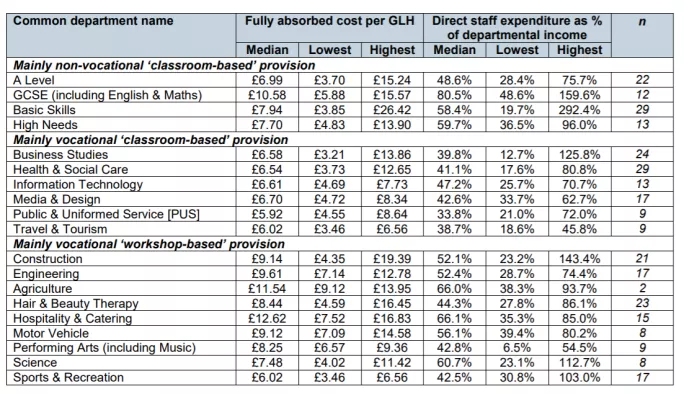A report published by the Department for Education today sets out the costs and cost drivers in the further education sector. It concludes that by far the largest single component in the costs of delivering an FE programme is the cost of tutorial/teaching staff – but these vary significantly between curriculum areas.
News: Unconditional offers made by colleges up by 60%
More: T-level providers to get £110m funding boost
Background: College could increase teachers' hours to cut costs
According to the report, the median values of the costs of direct staff expenditure as a percentage of income by department are "considerably higher" for GCSE English and maths resit provision than all other departments – 80.47 per cent of income.
The report says this could reflect “difficulties in recruiting staff and the level of pay required and/or the associated income not being fully credited”.
Other classroom based provision has the lowest median – generally around 40 per cent, while construction, engineering and motor vehicles are at 52.06 per cent, 52.36 per cent and 56.15 per cent respectively.
The median proportion of income spent on science is slightly higher (60.71 per cent) – salaries in these areas tend to have to be higher than the norm in order to attract and keep staff, the report highlights.
Hospitality and catering and agriculture top the list – at 66.13 per cent and 66.01 per cent respectively.
Looking at costs per learner's guided learning hours (GLH), the report finds that with one or two exceptions, such as public and uniformed service and travel and tourism, the cost of class-based provision is “remarkably close” – with median costs per GLH of between £6.54 and £6.70
For all but sports and recreation, the cost per GLH for workshop-based provision is significantly higher than for class-based provision, the report concludes, although within this group the courses with heavy equipment or material demands and higher staff salaries, such as construction, engineering and motor vehicles, are more expensive per GLH than most of the rest. Agriculture and Hospitality and Catering are further outliers at £11.54 and £12.62 respectively.
Cost by course
The report also considers apprenticeships provided by independent learning providers. It concludes that “it is very difficult for an ILP to deliver apprenticeships that are funded at the lower end of the range to an acceptable standard while making an acceptable return”.
“Broadly, any apprenticeship that has a tariff of £3,000 or less over 12 months is unlikely to be making any contribution to an ILP’s overheads: this is the case even in an entirely employer-based delivery model. More highly funded apprenticeships are more profitable if non-centre-based providers deliver them. When delivery is centre-based, their profitability is reduced considerably – effectively to zero even for the highest funded apprenticeships.”





